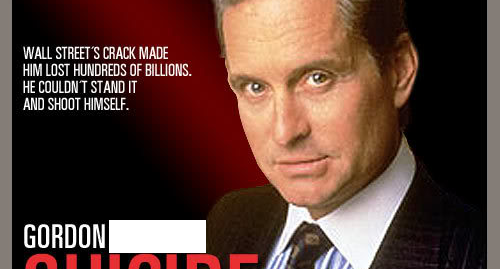A few years ago, as we were developing a software application for a major wholesale and retail distributor, I made a new friend, a guy named Gordon Saris.
That’s him above. (Don’t look, he is protected by copyrights; that’s why I had to remove his picture from here.)
And if you are wondering if I misspelled his name, think again; I can assure you that this is what he is called. We should not be fooled by movie directors!
Gordon acts like someone from fiction, but he sure feels real to me. His skills and experience. The goals he has set for his institution. What parts of running a bank he feels comfortable with, and where he’s likely to get lost or intimidated. Does he ever?
Just try to picture him, sitting in his leather padded, light brown, desk chair, his necktie slightly undone, showing off his fashionable white collar on light blue shirt, sleeves rolled up negligently, a manicured hand holding a cigar, as it should be held.
His crystal tumbler is gathering dew, it is strategically placed at arm’s length, between the scattered files and the multitude of gadgets specially made for the “successful” businessman.
In those days, Gordon was having rave reviews in the financial press; he was running a tight ship and his bank was making tons of money.
But success did not last, his empire collapsed because his administrative team was facing problems. We will see why in a bit.
Gordon was a great amateur of cigars, and not any cigars; they had to be Cuban. Sourcing the cigars in the US is tricky, to say the least, but Gordon had an excellent purchasing agent, Nick, in his administrative team. Cuban cigars were sourced, checked and paid for, in the shortest possible time. Obviously, no records were kept, and large sums of money exchanged hands. You see, Nick, used what is pejoratively called, a slush fund. Money found its way in and out of this ‘box’ with little or no control. Gordon discovered, later, that Nick had a weakness, and helped himself, to some of the stock (of cigars) and to the dough.
In the course of the day, other purchases were also made, and the accounting clerk entered all expenses in the bank’s ledger. Espresso coffee and replacement cups were also accounted for. I once watched the grin on the auditor face when a 10$ entry for diet Cokes was squeezed on the ledger, between two multi-million dollars disbursements. This situation had to change. Gordon sense of humour disappeared when he was not telling the jokes.
In spite of his extraordinary memory, Gordon was always fumbling his Rolodex, (the rotating business card index you can imagine on the right of the ‘picture’, just behind his desk light), looking for the ever changing phone numbers of his agents. Gordon voice would often go up, when he could not find the number of a person he needed to speak to urgently; every call was pressing in Gordon’s office, and Samantha, his secretary, was always on the receiving end of his bad temper.
During the rare moments when Gordon was left to his thoughts, he wished for an assistant who could respond, instantly and accurately, to his requests. Not that his needs were byzantine, but they were always unrelenting. You see, time is money, and it was very much so for Gordon. Sometimes he would want to look at the fine print of a thorny contract he negotiated a couple of months earlier. He remembered the gist, but the client became demanding when things were not going in the right direction. The contract was filed. Samantha had magician’s gifts, lifting ‘the’ agreement from the pile of documents scattered in the office. A short look (in your minds-eye) at Gordon’s desk will better convey what I mean. Samantha was at hand 24 hours a day, every day of the year.
Last week, I was having a short chat on the phone with Gordon, I heard him call for Irene, and inquired about Samantha. She was taken ill, apparently suffering from exhaustion after a severe breakdown. I could sense that Gordon was unhappy, and I quickly hang up to escape his predictable up-coming tantrum…
I wanted to help Gordon. How could a software developer make a difference in the day to day life of a successful banker? My company developed applications that managed distribution, issued invoices and took care of accounts and ledgers. We never looked at the nitty-gritty stuff that made a lovely day seem like a journey through hell.
All the secrecy surrounding the deals, the care one had to take when information was entered and stored in a database, the virtual locks security staff introduced to shroud this delicate information and the pain generated when the central bank control commission came for a visit.
But Gordon couldn’t care less about the problems of the security officer, he wanted global results showing on his multiple monitors, and preferably in graphical format, not like the never ending, scrolling tables of numbers on green monitors. He relegated these to the shelf under the window. He wanted it all, the totals, the numbers behind the totals and the details of numbers that did not look right. In one word ‘everything’.
And yet this was not the solution.
My friends could not comprehend the fascination I had for Gordon. Why bother getting to know this very person?
“It’s all about focus.”
In the absence of focus, distractions were everywhere.
Gordon inspired focus, he prompted focus, he induced focus.
If I was to succeed in helping him, I had to create a solution that would smooth his hectic day.
I needed to create this great application, this great product, a product that would be born from the ruthless sort of focus that made the right things right.
These will become the benefits that shall make our application exceptional.
Within my team, every possible benefit had to find its advocates, every cause its champions.
To be continued…





